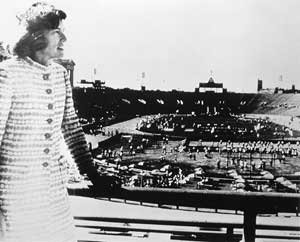 |
| Mrs. Shriver at Special Olympics Games 1968 (Photo Courtesy of Special Olympics) |
"...all human beings are created equal in the sense that each has the capacity and a hunger for moral excellence, for courage, for friendship and for love. Whatever the speed of our feet or the power of our arms, each of us is capable of these highest virtues. Intelligence does not limit love, nor does wealth produce friendship."
-Eunice Kennedy Shriver
It's 2007, and I'm looking out the taxi windows, taking in my first glimpses of Shanghai. Outside, there's a continuous line of orange and red and pink banners, each of them echoing the message of these Special Olympics World Summer Games—"I know I can." As a reporter for The MY HERO Project in search of hero stories, these signs are a good indication that I am in the right place to meet hundreds of people making a positive difference. And yet, I'm struck again and again, throughout the event and to this day, that there is one individual who has made it possible for all the others to become heroes: Eunice Kennedy Shriver. Mrs. Shriver laid the foundation for the Special Olympics movement more than four decades ago, and from her backyard in 1962 to the Shanghai Stadium in 2007, her vision has grown into an international organization that gives life, hope, and opportunity to people with intellectual disabilities all over the world.
A phone call Mrs. Shriver received in the summer of 1962 became the impetus for the energy and progress we are experiencing at the Games. At the other end of the line was an exhausted and frustrated mother of a child with an intellectual disability. She wanted to know what to do because no summer camp would take her child. Shriver had the solution immediately. She told the mother, "You don't have to talk about it anymore. You come here and I'll start my own camp. No charge for coming to camp, but you have to get your kid here and you have to pick him up." That was the start of Camp Shriver, a camp that is still in existence today.
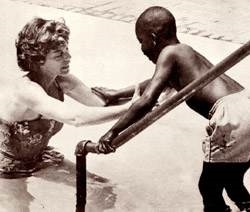
Shriver, a strong swimmer herself, got in the pool to teach the kids swimming lessons. She brought in enough volunteers and counselors to be sure that there was a one-to-one ratio of campers to staff. Each summer the family estate in Maryland was full of children. Mrs. Shriver's son, Tim, who is now the president and chairman of Special Olympics, describes these summers: I don't know exactly what age, whether it was five or six years old -- I remember looking out my window in the morning and seeing people come from institutions, get off yellow school buses, empty out into my backyard, raise the American flag, sing songs, and then fan out for kickball, or for swimming, or for horseback riding in this beautiful Maryland farm. Meanwhile, Tim and his four siblings were left in the house while their mother taught other people's children how to swim. Despite having to share their yard, and their mother, with hundreds of kids each summer - or more accurately, because of this experience - all five of Eunice and Sargent Shriver's children are actively involved with helping bring light to the lives of people with intellectual disabilities. The Kennedy-Shriver family has deep roots in this cause. |
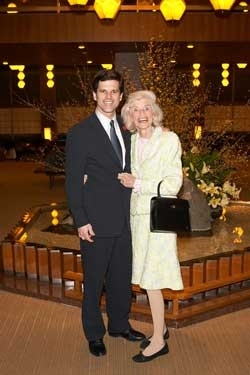 |
| Mrs. Shriver with son, Timothy (Photo courtesy of Special Olympics) |
Long before the start of Camp Shriver, Mrs. Shriver saw the capabilities within people with intellectual disabilities, and also, the terrible conditions they experienced in institutions where they were believed to belong. She grew up with eight siblings, and enjoyed swimming, sailing, and playing football with her brothers, including, Robert F. Kennedy and Edward (Ted) Kennedy, who would become senators, and John F. Kennedy, who would be elected the 35th President of the United States. Their sister Rosemary had what was at the time referred to as "mild mental retardation," but that didn't stop the family from including her in activities and vacations. Young Eunice was a competitive sportswoman and an accomplished swimmer and sailor; she included Rosemary as her teammate in sailing competitions, even if it meant giving up first for third.
Instead of being an embarrassment, Rosemary was the source of inspiration for Eunice's work, as well as the work of her brothers. She was the impetus for the Kennedy family's campaign for better treatment of those with intellectual disabilities. Robert would go on to inspect state mental institutions, Ted would help draft the Americans with Disabilities Act, and John would set up centers for research on intellectual disabilities. All would help change attitudes and policies to bring people with intellectual disabilities out of the shadows of institutions and return them to the light and warmth of their families, but it was Eunice who had a global vision for improving the lives of people with intellectual disabilities, and the drive to make it come to fruition.
"It was extraordinary to see that she was capable of major achievements helping these kids, and that's what she did. She dedicated her life to it," says Edward Shorter, the author of The Kennedy Family and the Story of Mental Retardation. Eunice managed to use her influence to get the job done in the large political arena, an unimaginable feat in an era where women weren't accepted as policymakers. It is not only influence and privilege, but incredible smarts, tenacity, and courage to face adversity that has made Eunice's fight for the health and welfare of children, and all people with intellectual disabilities, so successful.
Her ability to see limitations not as a dead end, but as a source of possibility is inspiring, to say the least. It is also a reminder to all of us to take a second, or third, look at what we are given, and turn it into what we want it to be. Mrs. Shriver talks about the impact of the people, events, and barriers in her life while speaking at the JFK Library and Museum in November of 2007:
"My life is about being lucky as a child. To be raised by parents who loved me and made me believe in possibilities - but in a strange way, perhaps my life also includes being lucky in the adversity I encountered. I am lucky that I experienced the sting of rejections as a woman who was told that the real power was not for me. I am lucky that I saw my mother and my sister Rosemary treated with unbearable rejection. I am lucky that I have had to confront political and social injustice around the world throughout my career. You might say, 'why are we lucky to have such difficult experiences?' The answer is simple: the combination of the love of my family and the awful sting of rejection helped me to develop the confidence that I needed to believe that I could make a difference in a positive direction."
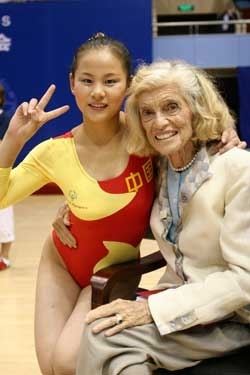 |
| Mrs. Shriver at 2007 World Games in China (Photo courtesy of Special Olympics) |
So, despite the boundaries facing her, Eunice dedicated her life to a mission of change and unwillingness to accept injustice and rejection. As her son-in-law, Arnold Schwarzenegger, notes in his speech at the Global Policy Summit on Human Rights in Shanghai, "People thought that people with intellectual disabilities should be locked up, but Eunice, of course, knew better. She's always known better. And trust me, the biggest mistake that anyone can do is to say 'no' to Eunice Shriver. I know that first-hand. She is the ultimate can-do woman."
This "can-do" attitude has created a momentum that continues to bring progress to the world - not only in the area of disabilities, but for human kindness, no matter what wars we are engaged in, or what our preconceptions are about people of varying races, religions, intellects, and beliefs. It carries the energy generated by 70,000 spectators, and thousands more athletes, volunteers, and staff, at the Opening Ceremonies in Shanghai Stadium. It inspires the whole crowd, no matter what nationality, to cheer when war-torn countries like Afghanistan, Iraq, and Iran carry their flags into the stadium. It works across boundaries to change attitudes and policies.
Hosting the Games has set in motion a movement for improving human rights in China, and the fact that we could be a part of a global discussion, in a country noted for serious human rights violations by Amnesty International, is a tribute to the success of Mrs. Shriver's vision and the whole of the Special Olympics movement. The country is taking its first steps into creating a generation of people who are learning tolerance and acceptance at an early age, and for the parents of children with intellectual disabilities, Eunice Shriver is a hero. One Special Olympics family, a mother and daughter from China participating in the Summit, sum up the feelings of many families throughout China and the world: "Mrs. Shriver is our hero because she brought happiness and freedom to people with intellectual disabilities around the world, especially in China, so that they will have self-confidence and happiness through participating in sports."
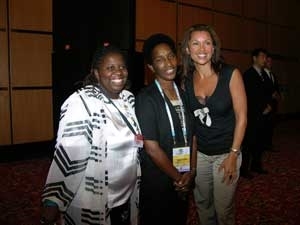 |
| Loretta Claiborne, pictured at center (Photo courtesy of Kathy Crockett) |
Track star and global messenger, Loretta Claiborne, is just one outstanding example of a Special Olympics success story. Not surprisingly, Loretta's hero is also Eunice Kennedy Shriver. "I guess she's a hero of many people here, but she's been my hero ever since I was a child," says Claiborne. "I started out in Special Olympics in 1970, when I was in high school. I've seen not only what she's done for me, but she made the sacrifice for others. The true spirit in life is to be wanted, to have a chance and she’s done that through sports with Special Olympics...that's all that she wanted to do--to say that every child, no matter who they are, no matter how fast they can learn, no matter how slow they can learn...have the right and the joy to be able to experience life...and one day say, 'I know I can.' Not 'I think I can,' but 'I know I can.'"
The words on the banners welcoming us to Shanghai will continually repeat not only on those roadways of one Chinese city but will be taken all over the globe. Hats off to you, Mrs. Shriver. Thank you for having the vision to change the world and the tenacity to make it happen.
Page created on 8/11/2009 3:47:44 AM
Last edited 7/1/2020 7:04:05 PM
